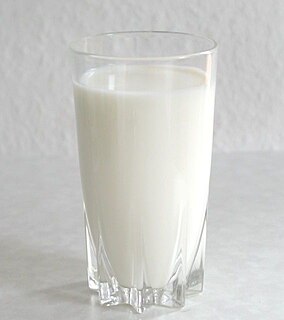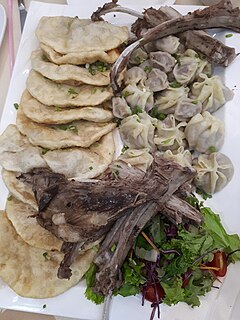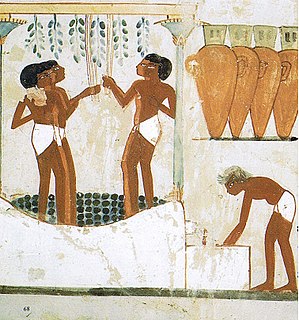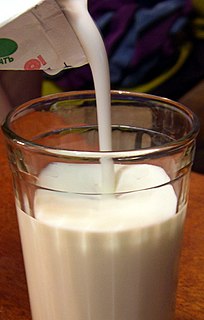Related Research Articles

Dairy products or milk products, also known as lacticinia, are food products made from milk. The most common dairy animals are cow, water buffalo, nanny goat, and ewe. Dairy products include common grocery store food items in the Western world such as yogurt, cheese and butter. A facility that produces dairy products is known as a dairy. Dairy products are consumed worldwide to varying degrees. Some people avoid some or all dairy products either because of lactose intolerance, veganism, or other health reasons or beliefs.

Porridge is a food made by heating or boiling ground, crushed or chopped starchy plants, typically grain, in milk or water. It is often cooked or served with added flavourings such as sugar, honey, (dried) fruit or syrup to make a sweet cereal, or it can be mixed with spices, meat or vegetables to make a savoury dish. It is usually served hot in a bowl, depending on its consistency. Oat porridge, or oatmeal, is one of the most common types of porridge. Gruel is a thinner version of porridge.

Yogurt also spelled yoghurt, yogourt or yoghourt, is a food produced by bacterial fermentation of milk. The bacteria used to make yogurt are known as yogurt cultures. Fermentation of sugars in the milk by these bacteria produces lactic acid, which acts on milk protein to give yogurt its texture and characteristic tart flavor. Cow's milk is the milk most commonly used to make yogurt. Milk from water buffalo, goats, ewes, mares, camels, and yaks are also used to produce yogurt. The milk used may be homogenized or not. It may be pasteurized or raw. Each type of milk produces substantially different results.

Kumis Mongolian: айраг, ääryg) is a fermented dairy product traditionally made from mare milk or donkey milk. The drink remains important to the peoples of the Central Asian steppes, of Turkic and Mongol origin: Kazakhs, Bashkirs, Kalmyks, Kyrgyz, Mongols, and Yakuts. Kumis was historically consumed by the Khitans, Jurchens, Hungarians, and Han Chinese of North China as well.

Probiotics are live microorganisms promoted with claims that they provide health benefits when consumed, generally by improving or restoring the gut flora. Probiotics are considered generally safe to consume, but may cause bacteria-host interactions and unwanted side effects in rare cases. There is some evidence that probiotics are beneficial for some conditions, but there is little evidence for many of the health benefits claimed for them.
Napolact is the main Romanian brand which belongs to the Dutch company FrieslandCampina and it’s one of the biggest dairy producers in Romania. It owns three production facilities in Cluj (Baciu), Târgu Mureș and Țaga.

Ukrainian cuisine is the collection of the various cooking traditions of the people of Ukraine, one of the largest and most populous European countries. It is heavily influenced by the rich dark soil (chernozem) from which its ingredients come and often involves many components. Traditional Ukrainian dishes often experience a complex heating process – "at first they are fried or boiled, and then stewed or baked. This is the most distinctive feature of Ukrainian cuisine".
Romanian cuisine is a diverse blend of different dishes from several traditions with which it has come into contact, but it also maintains its own character. It has been mainly influenced by Turkish and a series of European cuisines in particular from the Balkans, or Hungarian cuisine as well as culinary elements stemming from the cuisines of Eastern and Central Europe.
Latvian cuisine typically consists of agricultural products, with meat featuring in most main meal dishes. Fish is commonly consumed due to Latvia's location on the eastern shore of the Baltic Sea.

Viili (Finnish) is a mesophilic fermented milk product found in the Nordic countries, particularly Finland. Viili is similar to yoghurt or kefir, but when left unmixed, its texture is malleable, or "long". The metabolism of the bacteria used in the fermentation also gives viili a slightly different taste.

Kaymak, Sarshir, or Qashta/Ashta is a creamy dairy food similar to clotted cream, made from the milk of water buffalo, cows, sheep, or goats in Central Asia, some Balkan countries, some Caucasus countries, the countries of the Levant, Turkic regions, Iran and Iraq. In Poland, the name kajmak refers to a confection similar to dulce de leche instead.

Tibicos, or water kefir, is a traditional fermented drink made with water and a symbiotic culture of bacteria and yeasts (SCOBY) held in a polysaccharide biofilm matrix created by the bacteria. It is sometimes consumed as an alternative to milk-based probiotic drinks or tea-cultured products such as kombucha. Water kefir is typically made as a probiotic homebrew beverage. The finished product, if bottled, will produce a carbonated beverage.

Mongolian cuisine predominantly consists of dairy products, meat, and animal fats. The most common rural dish is cooked mutton. In the city, steamed dumplings filled with meat—"buuz"— are popular.

In food processing, fermentation is the conversion of carbohydrates to alcohol or organic acids using microorganisms—yeasts or bacteria—under anaerobic (oxygen-free) conditions. Fermentation usually implies that the action of microorganisms is desired. The science of fermentation is known as zymology or zymurgy.

Strained yogurt, Greek yogurt, yogurt cheese, sack yogurt, or kerned yogurt is yogurt that has been strained to remove most of its whey, resulting in a thicker consistency than normal unstrained yogurt, while still preserving the distinctive sour taste of yogurt. Like many types, strained yogurt is often made from milk enriched by boiling off some water content, or by adding extra butterfat and powdered milk. In Europe and North America, it is often made from low-fat or fat-free cow's milk. In Iceland, a similar product named skyr is made.

The goat or domestic goat is a domesticated species of goat-antelope typically kept as livestock. It was domesticated from the wild goat of Southwest Asia and Eastern Europe. The goat is a member of the animal family Bovidae and the tribe Caprini, meaning it is closely related to the sheep. There are over 300 distinct breeds of goat. It is one of the oldest domesticated species of animal, according to archaeological evidence that its earliest domestication occurred in Iran at 10,000 calibrated calendar years ago.

Kefir is a fermented milk drink similar to a thin yogurt or ayran that is made from kefir grains, a specific type of mesophilic symbiotic culture. The drink originated in the North Caucasus, in particular the Elbrus region along the upper mountainous sections of Circassia, Karachay and Balkaria from where it came to Russia, and from there it spread to Europe and the United States, where it is prepared by inoculating the milk of cows, goats, or sheep with kefir grains.
Jun, or Xun, is a fermented drink similar to kombucha, differing only in that its base ingredients are green tea and honey instead of black tea and cane sugar. Jun is brewed by fermenting green tea with a symbiotic culture of bacteria and yeast (SCOBY). Fruits, sweeteners, spices, and other flavor enhancers are also commonly added to make the taste of the beverage more appealing. Jun is not as popular as kombucha or other similar fermented drinks, so the commercial market for it is much smaller. Because there are not many companies selling it, and the brewing process is rather simple, many consumers of Jun choose to make it themselves. Many health benefits have been credited to Jun and fermented drinks in general, but these are unproven. Any health effects stemming directly from Jun as a whole have not been researched or conclusively substantiated, but some of Jun's main ingredients have been shown to individually have positive effects on the human body. Though Jun bears similarities to other fermented drinks like kombucha, water kefir, and kvass, it has enough differences to be considered a distinct drink.
Alexi Paul Pitu is a Romanian professional footballer who plays as a winger for Liga I club Farul Constanța.
References
- ↑ "Care e diferenţa dintre iaurt şi sana? - Scientia QA". www.scientia.ro.
- ↑ "Ce alegem? Chefir, Sana, sau Lapte Batut?". April 19, 2021.
- ↑ "Sana vs chefir. Care este cea mai bună alegere pentru tine?". life.ro. October 10, 2018.
- ↑ https://savoriurbane.com/paine-cu-lapte-batut-sau-sana-iaurt-kefir-reteta-de-paine-foarte-pufoasa/